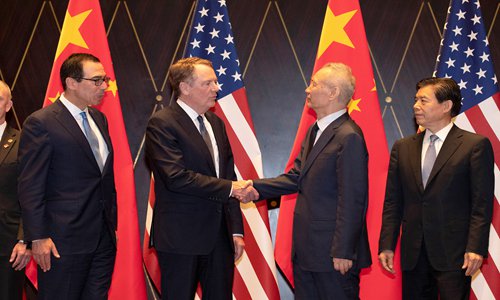HOME >> BUSINESS
Robust domestic economy favors China in trade talks
By Hu Weijia Source:Global Times Published: 2019/10/7 20:58:39

Chinese Vice Premier Liu He shakes hands with US Trade Representative Robert Lighthizer before a photo session after a round of trade talks in Shanghai on July 31. Photo: VCG
US officials will find it unrealistic to pursue a broad trade deal with China in negotiations set to begin this Thursday if the deal is a challenge to China's core interests.Chinese people paid scant attention to the trade tensions with the US during the National Day holidays, celebrated from October 1 to 7.
Crowds flocked to tourist spots across China, such as the Great Wall in Beijing. According to Alibaba Group, the volume of hotel bookings through its app surged by more than 300 percent year-on-year in the period between October 1 and 3 in 10 popular "red tourism" destinations, which have significance in the country's revolutionary history.
Although the number of people who crossed the border of China dropped 11 percent year-on-year during the first six days of the holiday, indicating a cooling market for outbound tourism, the holiday economy remains vigorous.
More Chinese appeared to opt for domestic sightseeing during this year's National Day holidays, making the festival a spending spree. Tourism income is likely to swell to a new record high.
Other leisure activities, including cinema box office revenues, will make a great contribution to the economy. The "golden week" has brought a tourism and consumer boom. China has for several years been trying to move away from its export-oriented and investment-led model toward one driven by consumption. Now the transition is taking place. A consumption boom in the golden week means greater economic endurance amid the China-US trade war.
The Chinese economy will stay vigorous without a trade deal with the US. A new round of China-US trade negotiations is expected to begin later this week, but if the US insists on a broad trade deal that contains too many core-interest related issues and forces China to make concessions, Washington will see nothing in the end.
The US economy has a different ethos than the Chinese one does. It will take more time for China and the US to work out bilateral differences in terms of trade.
The Chinese side has sincerity to reach an agreement with the US but it will not cede its core interests in exchange for a broad trade deal. If some consensus can be reached between the two countries, an "incomplete" agreement is the best choice for the US side.
We believe China and the US have common ground on which they can advance trade negotiations step by step with patience. But if Washington is too ambitious and unrealistic to solve complex economic problems once and for all, the US can get nothing, not even an incomplete agreement with China.
Trade talks with the US are likely to evolve into long-lasting negotiations and China is fully prepared. However, the faster China's consumption grows, the fewer bargaining chips are left in the US' hands. There is not much time left for the US side.
The author is a reporter with the Global Times. bizopinion@globaltimes.com.cn
Posted in: EYE ON ECONOMY